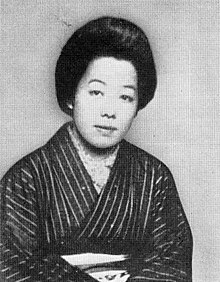Mizuno Senko
Mizuno Senko (3 December 1888 – 31 May 1919) (水野仙子 in Japanese, or みずの せんこ in kana) was a Japanese writer, born Tei Hattori. In her short career, she was published as a novelist, story writer, essayist, and journalist.
Early life
[edit]Senko was born in Sukugawa, Fukushima, one of the daughters of Naotaro Hattori. She graduated from high school in Sukugawa, and trained at Sukagawa Sewing College. She later studied with writer Tayama Katai in Tokyo.[1][2]
Career
[edit]Senko was a writer from her youth; she began publishing short essays in Joshi Bundan in 1905. She worked at Seitō (Bluestocking), a feminist literary magazine,[2][3][4] and was a reporter for the Yomiuri Shimbun newspaper. Much of Senko's writing was on topics related to women's lives, relationships, bodies, and illness. For example, her short story "For More Than Forty Days" ("Shijūyonichi", 1910), centers on a pregnant rural woman.[5][6][7] "Dignity of a Dog" ("Inu no igen"), another short story, features two women discussing marriage and their husbands' faults.[8]
Personal life
[edit]Senko married journalist Dosan Kawanami in 1911. She fell ill with liver disease and pleurisy in 1918, and died at Kusatsu Onsen, a hot springs resort in Gunma Prefecture, in 1919, at the age of 30.[3] Her widower published a collection of her works in 1920.
References
[edit]- ^ "MIZUNO Senko". Portraits of Modern Japanese Historical Figures, National Diet Library, Japan. Retrieved 4 November 2022.
- ^ a b Hiratsuka, Raichō (2010). In the Beginning, Woman was the Sun: The Autobiography of a Japanese Feminist. Columbia University Press. p. 197. ISBN 978-0-231-13813-0.
- ^ a b Hutchinson, Rachael; Morton, Leith Douglas (3 June 2016). Routledge Handbook of Modern Japanese Literature. Routledge. p. 84. ISBN 978-1-317-64772-0.
- ^ Reich, Pauline C.; Fukuda, Atsuko (October 1976). "Japan's Literary Feminists: The "Seito" Group". Signs: Journal of Women in Culture and Society. 2 (1): 280–291. doi:10.1086/493355. ISSN 0097-9740. S2CID 144035101.
- ^ Hartley, Barbara (14 November 2006). "Mizuno Senko (1888–1919)". In Copeland, Rebecca L.; Ortabasi, Melek (eds.). The Modern Murasaki: Writing by Women of Meiji Japan. Columbia University Press. pp. 311–338. doi:10.7312/cope13774-012. ISBN 978-0-231-51066-0.
- ^ Mitchell, Arthur M. (15 October 2020). Disruptions of Daily Life: Japanese Literary Modernism in the World. Cornell University Press. pp. 207–208. ISBN 978-1-5017-5293-3.
- ^ Seaman, Amanda C. (31 December 2016). Writing Pregnancy in Low-Fertility Japan. University of Hawaii Press. pp. 185, note 43. ISBN 978-0-8248-5992-3.
- ^ Senko, Mizuno (19 October 2019). "Dignity of a Dog, translated by Marissa Skeels". Adelaide Literary Magazine.

